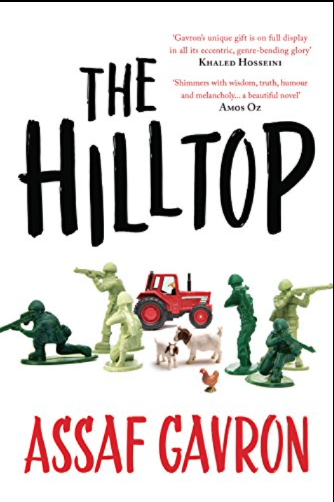The Hilltop, Assaf Gavron’s fifth novel, was first published in Hebrew in 2013 while the English translation came out a year later. It is a wonderful book and I am looking forward to reading his other novels including Croc Attack.
Assaf Gavron was born in Jerusalem in 1968 to British parents who moved to Israel in the 1950s. He is a writer, translator, singer and songwriter. In the past he has worked as a journalist and for a high tech firm.
The Hilltop begins with the settlement leader Othniel Assis driving back to the fictional settlement of Ma’aleh Hermesh C through the dusty roads of the West Bank. His passionate devotion to the settlement is the driving force behind its success. Despite threats to its existence the settlement continues to survive another day because of his resourcefulness, network of contacts and brilliant game-playing.
Gavron modelled Ma’aleh Hermesh C on a settlement southeast of Jerusalem where he spent some time doing background research for the novel. He has said there were several motivations behind people choosing to live on a settlement. These included economic, religious and Zionist reasons as well as a love of nature. Ma’aleh Hermesh C has characters with this same mix of inclinations.
Gavron has said that The Hilltop is not a political book about the settlements. Strange as it may seem – although it works in practice - the main character in the book is bureaucracy. He makes great use of political satire to make the sometimes erratic functioning of the Israeli state funny and believable.
The two human protagonists are brothers Roni and Gabi (Gavriel) Kupper; both of who represent Israeli archetypes. Their contrasting characters provide the author with a great device to tell the story of contemporary Israel.
Roni and Gabi grow up with adopted parents on a Kibbutz in the Galilee in northern Israel. Roni is sporty and high-achieving while Gabi a bit of loner. Both are emotionally stunted and capable of extreme behaviour including violence and excessive risk-taking.
Gavron has stated publicly that he sees Israel as a violent society. Most Israeli Jews are conscripted into the army and its citizens live with the permanent threat of conflict with its neighbours. So he wanted the characters to demonstrate a capacity for violence. This reflects the reality of life in Israel where true peace seems like a utopian dream.
The Kibbutz is portrayed as a great place to grow up but stifling and not somewhere where it is possible to demonstrate any ambition in life. So both Roni and Gabi leave in their early twenties after their army service. Roni goes to Tel Aviv and opens a gastropub – with brilliant observation of the city becoming a hangout for hipsters. He then meets a friend from the army who is doing well in financial services in New York and gets the qualifications to become a trader. The book superbly weaves the impact of the 2008 global financial crisis into the narrative.
Roni gets hit badly when he bets disastrously on the success of Blackberry mobile phones over Apple’s iPhone. He flees America having lost all his own and his clients’ money having become embroiled in fraud and insider trading. He ends up at Ma’aleh Hermesh C, by then his brother’s settlement, as he has nowhere else to go.
Gabi’s life story is sad. He is ostracised on his Kibbutz when young after the takes violent revenge on a child who bullies him. He also shows a capacity for violence when he is in the army when the chefs refuse to give him with food. When he leaves the kibbutz to go travelling, after his army experience is cut short, he enjoys a successful spell. First he works for a furniture moving company in New York before moving to Florida to work as a fund-raiser for Israeli causes. By chance he bumps into Anna who he knows from when she was a classmate from a neighbouring Kibbutz.
Gabi and Anna fall in love and get married. But life in Israel become dark again as his marriage fails and he loses the child he loves because of his unkind, irresponsible and cruel behaviour. He demonstrates an inhumanity that only gets corrected when he finds salvation after turning to the Jewish religion.
Gabi’s story then becomes the most hopeful in the book. He is able to gain forgiveness from one of the chefs he had hurt during his time in the army. He becomes a respected individual for his hard work and dedication to good deeds in the settlement. At the end of the book, it looks like he is going to settle down in a new loving relationship with a fellow divorced settler.
Although The Hilltop has generally been well received it has been criticised for its humorous tone and its failure to explore the lives of its Palestinian characters. In my view this is a mistaken criticism as its goal is to explore Israel’s national archetypes and the contortions of the Israeli bureaucracy,
I loved the way that Gavron brings great comedy to the tale of the settlement and the story of the brothers.

